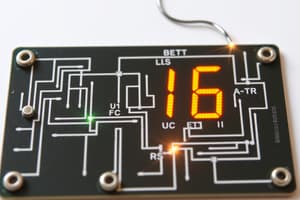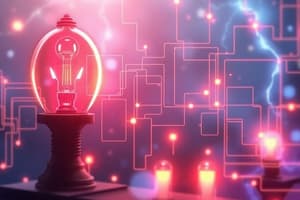Podcast
Questions and Answers
What is the movement of electrons in a conductor called?
What is the movement of electrons in a conductor called?
- Electric potential
- Electric charge
- Energy transfer
- Electric current (correct)
In which direction is the current considered to flow?
In which direction is the current considered to flow?
- From negative to positive (correct)
- No specific direction
- From positive to negative
- In both directions simultaneously
What is the energy that a charged particle has at a given position due to its charge and the electric field called?
What is the energy that a charged particle has at a given position due to its charge and the electric field called?
- Conductive energy
- Electric potential (correct)
- Electron movement
- Electric charge
What unit is electric potential measured in?
What unit is electric potential measured in?
What makes it possible for electricity to flow through a conductor, such as a wire?
What makes it possible for electricity to flow through a conductor, such as a wire?
What type of energy can travel through a circuit, often including a battery, a light bulb, and a switch?
What type of energy can travel through a circuit, often including a battery, a light bulb, and a switch?
What is the purpose of circuit analysis?
What is the purpose of circuit analysis?
According to Kirchhoff's Current Law, what must be true at any junction in a circuit?
According to Kirchhoff's Current Law, what must be true at any junction in a circuit?
What does Kirchhoff's Voltage Law state about the sum of voltages in a closed loop in a circuit?
What does Kirchhoff's Voltage Law state about the sum of voltages in a closed loop in a circuit?
What are some applications of electricity mentioned in the text?
What are some applications of electricity mentioned in the text?
In conclusion, how is electricity described in the text?
In conclusion, how is electricity described in the text?
What principle are Kirchhoff's laws based on?
What principle are Kirchhoff's laws based on?
Flashcards are hidden until you start studying
Study Notes
Electricity
Electricity is a fundamental force of nature that is a part of all matter. It is the force that makes it possible for electricity to flow through a conductor, such as a wire. Electricity is all around us, and it plays a crucial role in our daily lives. In this article, we will explore the fascinating world of electricity and its applications in circuit analysis.
What is Electricity?
Electricity is a type of energy that can travel through a circuit, which often includes a battery, a light bulb, and a switch. When you flip the switch, electricity flows through the circuit, lighting up the bulb. Electricity is transferred from one atom to another in the form of electrons.
Electric Charge
The movement of electrons in a conductor is called an electric current. Electric charges are always paired, so if electrons move from one place to another, they will leave behind a positive charge. The direction of current is considered to be from negative to positive.
Electric Potential
Electric potential is the energy that a charged particle has at a given position due to its charge and the electric field that is acting on it. In simpler terms, it refers to the amount of work needed to bring a positive unit test charge from infinity to a specific point without any acceleration. Electric potential is measured in volts.
Circuit Analysis
Circuit analysis is the process of analyzing an electric circuit to determine the current flowing through each component and the voltage across each component. This is done by applying Kirchhoff's laws, which are two fundamental laws of circuit analysis that are based on the principles of conservation of charge and energy.
Kirchhoff's Current Law
Kirchhoff's Current Law states that the sum of the currents at any junction in a circuit must be zero. This means that the current flowing into a junction must equal the current flowing out of it.
Kirchhoff's Voltage Law
Kirchhoff's Voltage Law states that the sum of the voltages in a closed loop in a circuit must be zero. This means that the voltage drop across every component in a circuit must equal the voltage rise across the same component.
Applications of Electricity
Electricity has numerous applications in our daily lives, including powering our homes, running our appliances, and providing light. It is also used in transportation, communication, and many other industries.
In conclusion, electricity is a fascinating force that plays a crucial role in our lives. Through circuit analysis, we can understand how electricity flows through a circuit and how it can be used to power our world.
Studying That Suits You
Use AI to generate personalized quizzes and flashcards to suit your learning preferences.




